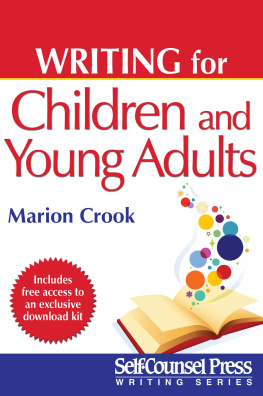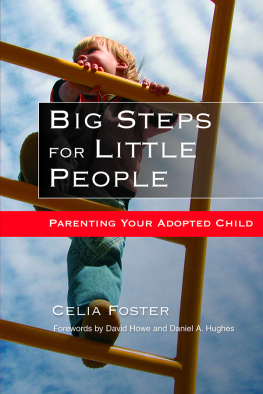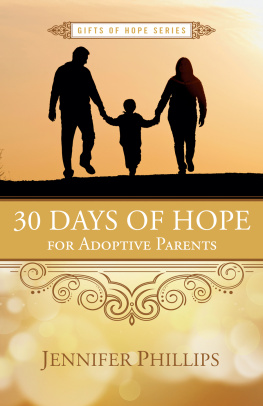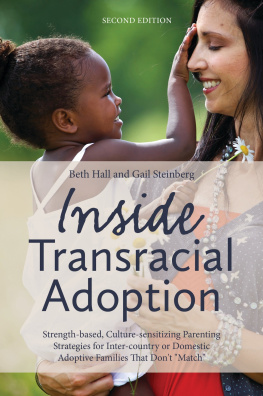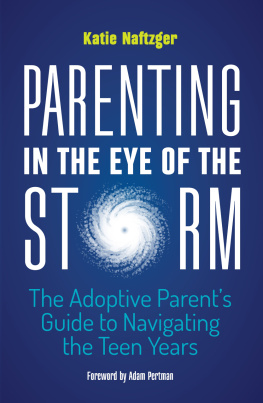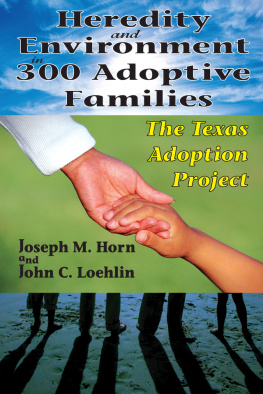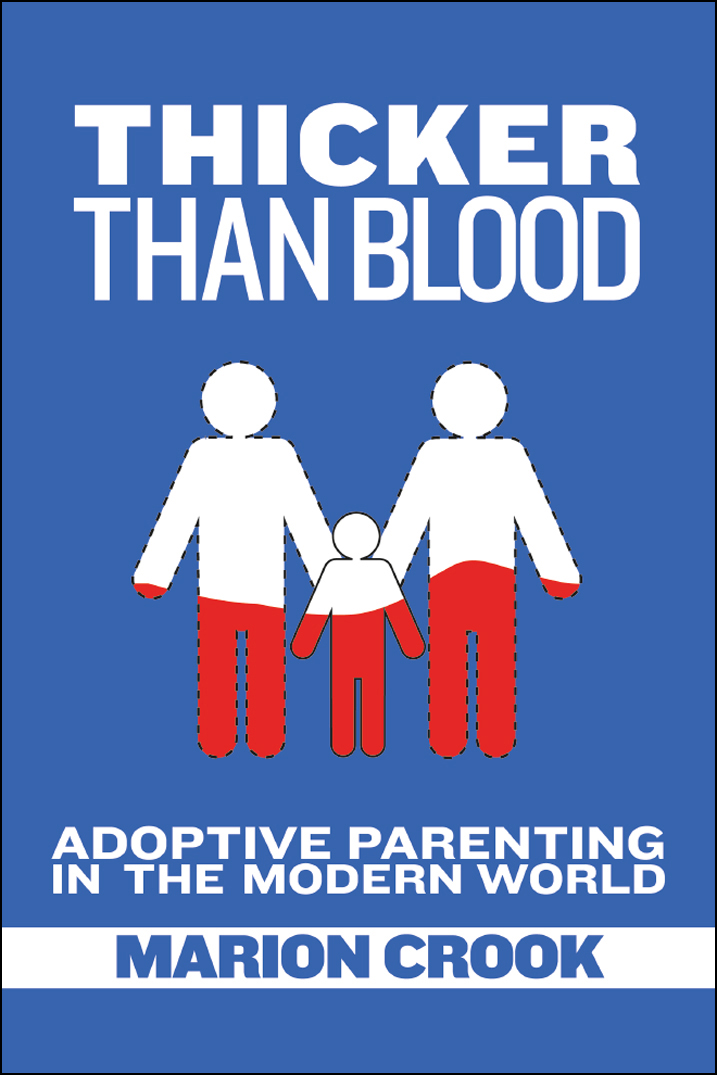

THICKER THAN BLOOD
Copyright 2016 by Marion Crook
Foreword copyright 2016 by Adam Pertman
All rights reserved. No part of this book may be reproduced in any part by any meansgraphic, electronic, or mechanicalwithout the prior written permission of the publisher, except by a reviewer, who may use brief excerpts in a review, or in the case of photocopying in Canada, a license from Access Copyright.
ARSENAL PULP PRESS
Suite 202 211 East Georgia St.
Vancouver, BC V6A 1Z6
Canada
arsenalpulp.com
The publisher gratefully acknowledges the support of the Canada Council for the Arts and the British Columbia Arts Council for its publishing program, and the Government of Canada (through the Canada Book Fund) and the Government of British Columbia (through the Book Publishing Tax Credit Program) for its publishing activities.

Cover and text design and cover illustration by Oliver McPartlin
Library and Archives Canada Cataloguing in Publication
Crook, Marion, 1941-, author
Thicker than blood: adoptive parenting in the modern world / Marion Crook.
Includes bibliographical references and index.
Issued in print and electronic formats.
ISBN 978-1-55152-632-4 (html)
1. Adoptive parents. 2. Parenting. 3. Adopted childrenPsychology. 4. AdoptionPsychological aspects. I. Title.
HV875.C763 2016 649.145 C2015-908282-X
C2015-908283-8
To all my children in gratitude for
all they have taught me
Adopting
It was supposed to be simple
Easy to love with my heart so full
But perhaps not so easy for my sons
Who rocked with a sudden shock to trust
Not felt by me.
It was an underground shift
A shudder felt later, much later.
For some, that shift trembles for decades.
For others, a ripple that disappears
Below my senses.
I happily assumed no fault line.
Ignorance is not helpful.
It is better to be alert to seismology
Of the sliding yet to come.
Better to build a house of love, strong and flexible, capable of movement
That can rock with the tremors and sudden quakes at the foundation
Than wonder why our children
Are dancing, twisting, striving to fly
Unaware they are trying to keep their balance
On the rolling earth beneath them.
Table of Contents
Guide
Contents
My thanks to the over fifty young people who gave me their time and their information in my research. I agreed not to publish their names and so cannot thank them individually.
Thanks also to the Adoptive Families Association of British Columbia, in particular Karen Madeiros, Mary Caros, and Brianna Brash-Nyberg. Thanks to Adam Pertman of the National Center of Adoption and Permanency for his encouragement. Dan Grant, Senior Planner (Retired), Citizenship & Immigration Canada, the collector of my extensive family history, and the adoptive parent of two now-adult children, read the manuscript and gave me valuable advice. Dennis Emmett, retired elementary school principal and adoptive parent of two, read the manuscript for relevance. Jill Brandon, my beta-reader, read for content and had an eagle eye for spelling. Nancy Nelson generously added her experience as a foster parent. I am grateful to my sons who added their perspective as adoptees and to Dean Fortin who also gave me information on what it is like to be an adult adoptee.
My previous book The Face in the Mirror: Teens and Adoption gave the perspective of teen adoptees on their experience. In this book, I have added the retrospective thoughts of adult adoptees on what would have helped them and their adoptive parents navigate the sometimes difficult waters of their relationships. This book was built in part on the knowledge I gained from the many people who contributed to the earlier book and to the insight and ideas of those who live in the adoption world at some point of the constellation. My thanks to the many passionate people I met at conferences and meetings during the research stage of this book who talked about their adoption experiences and encouraged my writing.
Adam Pertman
The phone conversation took place over two decades ago, but I can still hear my mothers words as clearly as if shed spoken them yesterday. I had called to tell her that, minutes earlier, my wife and I had received the exhilarating, exquisite news that a boy had been born in Colorado and his mother had chosen us to become his adoptive parents. Mazel tov, thats so wonderful, my mother said, her smile so penetrating that it was almost audible. Then, lovingly, almost incidentally, she offered a bit of wisdom that has stayed with me ever since. All right, she said. Now you can worry for the rest of your life.
Nearly all parents, regardless of how we become parents, experience the poignant truth of my mothers insightfrom the time we begin worrying about our childrens health and development as infants, through the continuum of anxiety about their conduct and performance during their school years, and finally, into our ongoing concern about their careers and relationships once they become adults. The complicated truth is that, among the many positive and negative behaviours children induce in their parents, one is (usually) unambiguously wonderful: perpetual, selfless concern for another human being.
At a time when adoption is increasingly normalized throughout North Americacertainly more so on this continent than any othermost people have come to understand that parents through adoption are mainly just plain parents, with the same day-to-day feelings, tasks, and responsibilities as parents through in-vitro fertilization; parents through sperm or egg donation (in quotes because the donors of the gametes are usually paid, but thats another conversation); parents through remarriage; parents through the tried-and-true, broken-condom approach; single and gay and lesbian and kinship and divorced and guardianship and foster parents; and so on. All parents. In so many ways, probably most ways, all the same. And all very, very different, with unique characteristics and challenges and realities.
Its important to understand the differences among the many types of contemporary families, or at least have a strong sense of them, because otherwise we risk falling into the trap of judging which are better or worseand that judgment can translate into derogatory language, condescending attitudes, and hurtful actions. As recently as the middle of the last century, for instance, society stigmatized divorce and (Im exaggerating just a little to make the point) wondered how children could survive the experience; no one now says divorce is a good thing, but we generally recognize its realities and dont systemically malign those affected by it. Similarly, some people still believe there shouldnt be single or LGBT parents, primarily because the children ostensibly suffer damaging consequences; research and experience tell a very different story, of course, and so single-parent families are already broadly accepted and, by historical standards, LGBT-led families are getting there at lightning speed, accelerated by the legalization of same-sex marriage.


